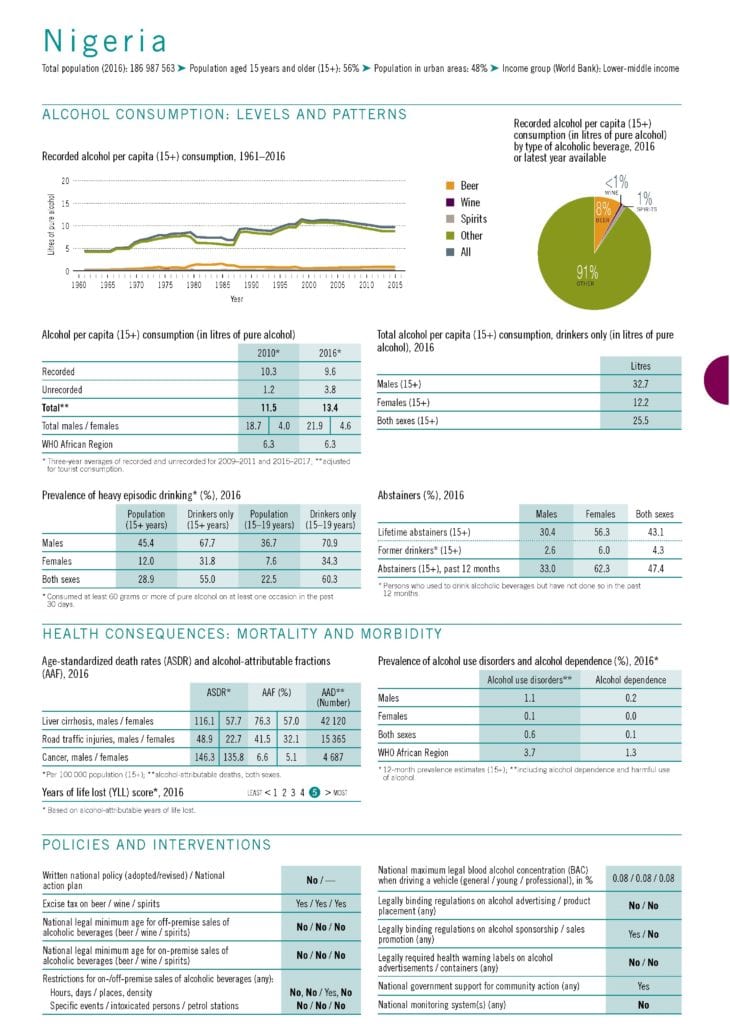Alcohol sales are growing in Nigeria and generating more profits for Big Alcohol at the cost of the Nigerian people’s health and wellbeing.
In the first half of 2022, the four largest alcohol companies in the country, Nigerian Breweries, Guinness Nigeria, International Breweries and Champion Brew generated a combined N599.11 billion, according to data gathered by Prime Business Africa. This was a 31.2% increase from the N456.44 billion generated in the same period in the previous year.
These four companies recorded a net profit of N36.14 billion in the first half of 2022. This is a 54.1% increase from the N23.44 billion reported in the same time period last year.
The combined rise in profit was driven by a rise in profits of Guinness Nigeria, Nigerian Breweries, and Champion Brew compared to the previous year. Meanwhile, International Breweries recorded a reduction in profit compared to the last year.
Nigerian Breweries Plc, is the largest brewing company in Nigeria. It is a subsidiary of the world’s second largest beer producer, dutch Heineken. Also Champion Brew is owned by Heineken.
Guinness Nigeria is a subsidiary of British alcohol giant Diageo, the second largest liquor producer in the world.
International Breweries is a subsidiary of Anheuser-Busch InBev, the world’s largest beer producer.
Big Alcohol thirsting for Africa
This means that Western alcohol giants are raking in windfall profits from the Nigerian market, leaving people and society in Nigeria with the costs of the harm that these companies and their products are causing.
Big Alcohol, specifically Big Beer, is hounding the African continent in the pursuit of ever more profits. The African region provides a lucrative opportunity for the alcohol industry. While 16% of the world’s population live on the continent only 5% are alcohol consumers. Big Alcohol is aiming to convert people in the region who are mostly alcohol-free into alcohol users to profit from them.
At the same time, countries in the African continent lack comprehensive alcohol policy frameworks that the World Health Organization is recommending. This allows Big Alcohol to exploit these societies by flooding children, young people, families, and communities with alcohol. The growing young middle-class population and increasing labor force mean higher disposable incomes. Big Alcohol plans to turn this into profit.
As in many other African countries, multinational alcohol corporations have been locked in turf wars in Nigeria. Most notable in this fight was Heineken’s acquisition of additional equity stakes in Nigerian Breweries, in 2020.
Even beyond Nigeria, the problem of Big Alcohol marketing and competition is rampant in other countries in sub-Saharan Africa.
- AB InBev is pumping ever higher volumes of alcohol into communities using super-sized bottles, driven by aggressive competition with rival Heineken.
- Both beer giants are from Western countries.
- In East Africa, alcohol producers are competing for control of the liquor market — currently the most lucrative.
- In West Africa, for example, Ivory Coast, Heineken-owned Brassivoire, and Castel-owned Solibra are putting children and youth in harm’s way through their relentless beer marketing war.
Alcohol harm in Nigeria
Big Alcohol’s profits in Nigeria come at a significant, health, social and economic cost to the Nigerian people.
The World Health Organization (WHO) reports that Nigeria had a total per capita alcohol consumption of 13.4 liters per person in 2016. This is far above the average of the WHO African Region. In 2016, over half (55%) of Nigerians over 15 years who use alcohol were engaging in binge alcohol consumption.
The harm caused by alcohol is grave in the country. In 2016 alcohol caused,
- 42,120 deaths due to liver cirrhosis,
- 15,365 deaths due to road traffic injuries, and
- 4687 deaths due to cancer.
Last year, a study exposed that Nigerian college students, specifically young girls, were facing significant alcohol problems.
Despite the harm that the alcohol industry is causing to Nigerian society, the country does not currently have a comprehensive alcohol policy.
- There is no legal minimum age for alcohol use.
- This means a lack of protection of children and young people from alcohol harm.
- There are no restrictions on alcohol sales, making alcohol highly available.
- There are no regulations of alcohol advertising. This means alcohol companies can flood everyone with alcohol ads everywhere all the time.
Even the excise taxes on alcohol in Nigeria can be improved much more to generate revenue for the government, and reduce the alcohol burden effectively. The World Bank has recommended an alcohol tax raise for Nigeria. This would reduce alcohol harm while generating an additional US$ 1.46 billion.
The Nigerian government must take urgent action to improve alcohol policy solutions in Nigeria to protect people and communities from the products and practices of the alcohol industry.

